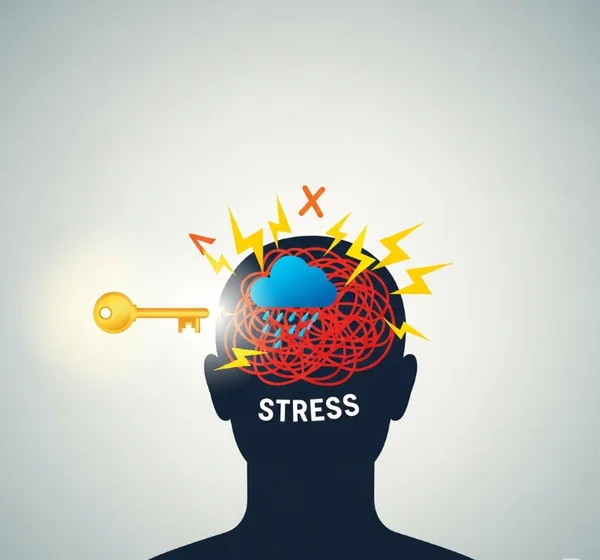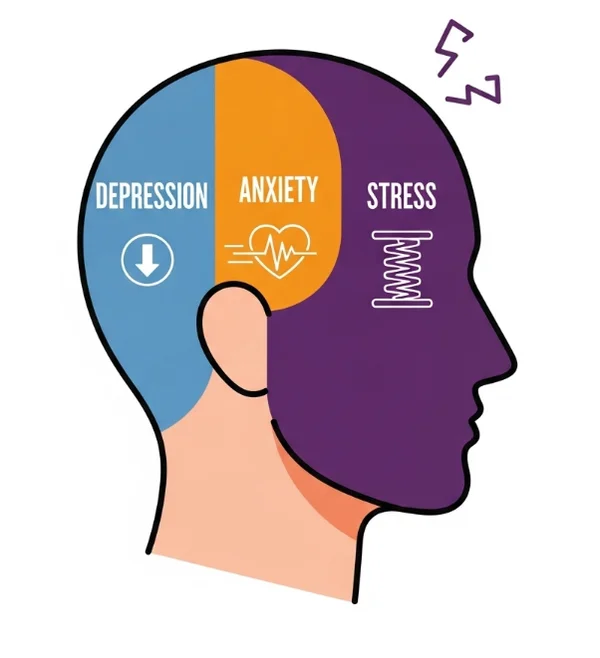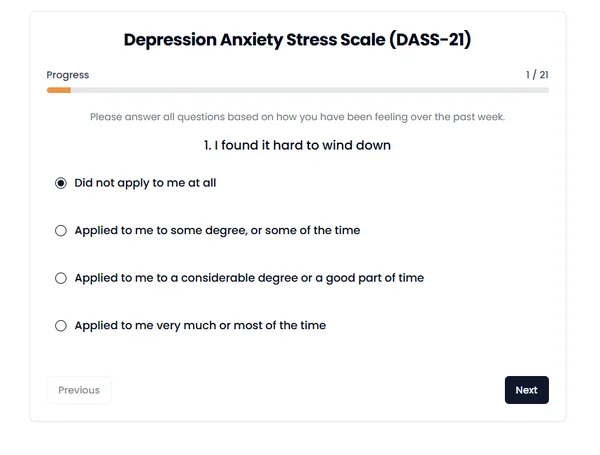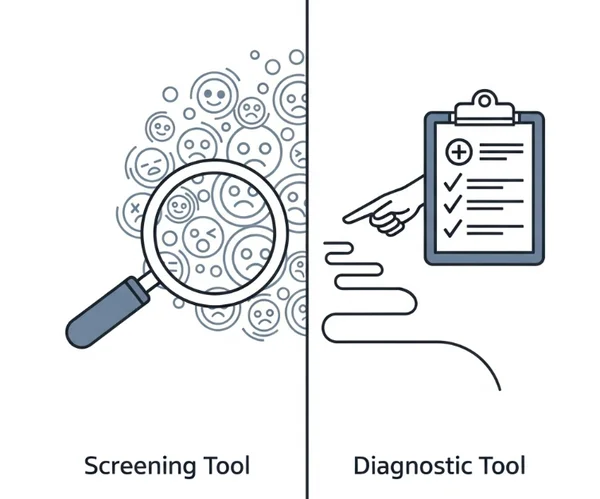DASS-21 가이드: 무엇이고 어떻게 도움이 될까요?
July 6, 2025 | By Evelyn Reed
압도당하거나, 초조하거나, 평소 같지 않다고 느끼지만 그 이유를 정확히 알 수 없나요? 빠르게 변화하는 세상에서 우리는 혼란스럽고 정의하기 어려운 다양한 감정을 경험하기 쉽습니다. DASS-21 테스트란 무엇인가요? 이는 이러한 감정을 이해하는 데 도움이 되도록 설계된 간단하고 효과적인 도구입니다. 이 가이드에서는 우울증 불안 스트레스 척도(DASS-21)에 대해 알아야 할 모든 것을 자세히 안내하여, 정서적 안녕을 더 잘 이해하기 위한 명확한 경로를 제공합니다. 명확성을 얻을 준비가 되었다면 언제든지 플랫폼에서 무료 DASS-21 평가를 시작할 수 있습니다.

우울증 불안 스트레스 척도(DASS-21)란 무엇인가요?
우울증 불안 스트레스 척도(DASS-21)는 과학적으로 검증된 자가 평가 도구입니다. 이는 우울, 불안, 스트레스라는 세 가지 뚜렷한 감정 상태를 측정하는 신뢰할 수 있는 방법으로 널리 인정받고 있습니다.
DASS-21 척도의 기원 및 목적
연구원 Lovibond와 Lovibond가 개발한 이 척도는 전반적인 정서적 고통을 측정할 뿐만 아니라 종종 겹치는 증상 간의 차이를 더 명확히 구분할 수 있도록 돕기 위해 만들어졌습니다. 이러한 감정들을 혼합하는 다른 테스트와 달리, DASS-21은 이러한 감정들을 구별하여 당신의 특정 정신 상태 에 대한 더 명확한 그림을 제공하도록 특별히 설계되었습니다.
자가 평가 도구이지 진단 도구가 아닙니다
무엇보다도 DASS-21은 진단 도구가 아닌 선별 도구라는 것입니다. 체온계와 같다고 생각하면 됩니다. 열이 있다는 것을 알려줄 수는 있지만 정확한 원인은 알 수 없습니다. 마찬가지로, 이 정신 건강 테스트 는 정서적 고통을 강조할 수 있지만, 공식적인 진단은 자격을 갖춘 의료 전문가만이 내릴 수 있습니다.
누가 DASS-21의 혜택을 받을 수 있나요?
자신의 정신 건강에 대해 궁금한 사람이라면 누구나 혜택을 받을 수 있습니다. 여기에는 다음이 포함됩니다.
- 학업 압박과 삶의 변화에 직면한 학생.
- 일과 삶의 균형과 높은 스트레스 환경에 고군분투하는 전문가.
- 지속적인 슬픔, 걱정 또는 긴장감을 경험하는 사람.
- 치료사 또는 의사와의 대화를 시작할 지점을 찾는 사람.
DASS-21 테스트는 실제로 무엇을 측정하나요?

DASS-21의 가장 큰 강점 중 하나는 세 가지 특정 정서 경험 영역을 분리하고 측정하는 능력입니다. DASS-21 평가 는 이 점에서 어떻게 작동할까요? 21개 질문 각각은 세 가지 하위 척도 중 하나에 해당합니다.
우울 하위 척도: 낮은 기분 및 무쾌감증 평가
이 하위 척도는 낮은 기분, 자존감 저하, 삶에 대한 즐거움이나 흥미 감소(무쾌감증)와 관련된 증상을 측정합니다. 이 범주의 질문은 의기소침함, 무가치함 또는 일을 시작할 의욕을 내는 데 어려움을 느끼는 것에 대해 물을 수 있습니다.
불안 하위 척도: 신체적 및 신경적 흥분 이해
불안 척도는 심장이 빨리 뛰거나 입이 마르는 것과 같은 생리적 흥분 증상과 주관적인 두려움과 공황감에 초점을 맞춥니다. 떨림, 공황에 대한 걱정 또는 공황 발작에 가까운 느낌에 얼마나 영향을 받았는지 평가합니다.
스트레스 하위 척도: 만성적인 긴장감 및 짜증 평가
이 하위 척도는 지속적인 긴장 상태, 휴식의 어려움, 짜증이나 화가 나기 쉬운 낮은 역치를 측정합니다. 상황에 과도하게 반응하거나, 초조하거나, 긴장을 풀기 어렵다고 느끼는 빈도에 대해 질문합니다.
세 가지 척도의 차이점과 겹치는 부분
이러한 상태들은 혼란스럽게 느껴질 수 있지만, DASS-21은 이를 구별하는 데 도움이 됩니다. 예를 들어, 긴장을 풀 수 없는 것은 스트레스의 주요 징후인 반면, 특정 상황에 대한 두려움은 불안을 더 많이 나타냅니다. 이러한 차이점을 이해하는 것은 정서적 안녕 을 개선하고 스트레스 수준 을 효과적으로 관리하기 위한 중요한 단계입니다.
온라인 DASS-21 평가는 어떻게 작동하나요?

저희 플랫폼에서 테스트를 진행하는 것은 가능한 한 간단하고 스트레스 없이 이루어지도록 설계되었습니다. 우리는 모든 단계에서 귀하의 경험과 개인 정보를 최우선으로 생각합니다.
21개 질문 형식: 간단하고 빠름
평가는 21개의 간단한 질문으로 구성됩니다. 각 질문에 대해 지난주에 해당 진술이 얼마나 적용되었는지 평가하기만 하면 됩니다. 전체 과정은 완료하는 데 약 3분밖에 걸리지 않습니다.
저희의 약속: 귀하의 개인 정보 및 기밀 유지
귀하의 개인 정보는 무엇보다 중요합니다. 귀하가 제공한 답변과 받는 결과는 기밀로 유지됩니다. 저희는 귀하가 걱정 없이 감정을 탐색할 수 있는 안전한 공간을 만들었습니다. 기밀 DASS-21 평가를 완전한 마음의 평화로 시작할 수 있습니다.
테스트 완료 후 기대할 수 있는 것
21개 질문을 모두 완료한 직후, 우울, 불안, 스트레스 하위 척도에 대한 점수와 심각도 등급(정상, 경도, 중등도, 심함, 매우 심함)을 받게 됩니다. 더 깊은 통찰력을 원하는 분들을 위해 상세한 분석과 실행 가능한 제안을 제공하는 AI 기반 맞춤형 보고서도 제공합니다.
과정이 얼마나 간단하고 빠르며 안전한지 보셨으니, 3분을 투자하여 귀중한 통찰력을 얻는 것은 어떨까요?
DASS-21 테스트의 주요 이점
왜 하루 중 3분을 이 테스트에 투자해야 할까요? 그 이점은 단순한 점수 이상으로 확장됩니다.
- 객관적인 통찰력 얻기: "괜찮지 않다"는 막연한 느낌을 보다 구체적이고 측정 가능한 데이터 포인트로 전환합니다.
- 감정 구분: 스트레스, 불안 또는 우울 증상 중 어느 것이 주로 자신의 고통을 유발하는지 파악하는 데 도움이 되어, 문제에 접근하는 방식을 안내할 수 있습니다.
- 웰빙 추적: DASS-21 척도 를 주기적으로 사용하여 신체 건강을 추적하는 것처럼 자신의 감정 상태를 시간이 지남에 따라 모니터링할 수 있습니다.
- 대화의 시작점: 결과는 친구, 가족 또는 정신 건강 전문가에게 자신의 기분을 설명하는 데 유용하고 구조화된 방법을 제공할 수 있습니다.
중요: DASS-21은 진단 도구인가요?

아무리 강조해도 지나치지 않을 정도로 중요한 점은 DASS-21은 강력한 선별 도구 이지만 임상 진단을 제공하지는 않습니다.
선별 도구의 역할 이해하기
선별 도구는 특정 질환의 위험에 처해 있거나 추가 평가의 혜택을 받을 수 있는 개인을 식별하도록 설계되었습니다. DASS-21은 잠재적인 문제를 감지하여 필요한 경우 다음 단계를 취하도록 지원합니다.
전문가 진단이 중요한 이유
심리학자나 의사와 같은 자격을 갖춘 전문가는 전체적인 평가를 수행하여 귀하의 전체 병력과 맥락을 고려하여 정확한 진단을 내리고 맞춤형 치료 계획을 세울 수 있습니다.
결과를 책임감 있게 사용하는 방법
결과를 정보의 원천이자 자기 성찰의 촉매제로 여기십시오. 이를 통해 자신의 패턴을 더 잘 이해하고 어떤 종류의 지원이나 자기 관리 전략이 자신에게 가장 도움이 될지에 대한 지침으로 사용하십시오.
DASS-21로 정서적 명확성을 향한 첫걸음
요약하자면, DASS-21은 우울, 불안, 스트레스 수준에 대한 신속하고 명확한 스냅샷을 제공하는 귀중하고 과학적으로 뒷받침되는 자가 평가 도구입니다. 이는 더 나은 자기 인식과 적극적인 정신 건강 관리를 향한 기밀적이고 접근하기 쉬운 첫걸음입니다. 자신의 감정의 고유한 본질을 이해함으로써 올바른 종류의 지원을 구하고 더 효과적인 대처 전략을 구축할 수 있는 힘을 얻게 됩니다.
DASS-21 테스트: 자주 묻는 질문
DASS-21 척도의 신뢰성과 타당성은 어떻습니까?
DASS-21은 널리 사용되고 잘 연구된 심리학적 도구이며, 신뢰성과 타당성에 대한 강력한 증거를 가지고 있습니다. 이는 다양한 인구 집단에 걸쳐 측정하고자 하는 것을 일관되게 측정한다는 것을 의미합니다.
DASS-21 테스트를 완료하는 데 얼마나 걸립니까?
이 테스트는 속도와 편의성을 위해 설계되었습니다. 대부분의 사람들은 21개 질문 모두를 2~3분 안에 완료합니다.
DASS-21 테스트 결과는 기밀인가요?
예. Dass-21.com은 귀하의 개인 정보를 보호하기 위해 최선을 다하고 있습니다. 귀하의 응답과 결과는 기밀로 유지되어 자기 탐색을 위한 안전한 환경을 제공합니다.
DASS-21 테스트는 무료인가요?
물론입니다. 언제든지 비용이나 의무 없이 저희 웹사이트에서 무료 DASS-21 테스트에 액세스할 수 있습니다.
DASS-21 결과를 받은 후 무엇을 해야 하나요?
점수가 중간에서 매우 심한 수준의 정서적 고통을 나타내거나 결과에 대해 어떤 이유로든 우려되는 경우, 의사 또는 정신 건강 전문가와 상의할 것을 강력히 권장합니다. 귀하의 결과는 그 대화의 훌륭한 시작점이 될 수 있습니다. 모든 점수에 대해, 그것을 자기 관리 전략이나 생활 방식 변화를 탐색하는 데 도움이 되는 정보로 간주하십시오.